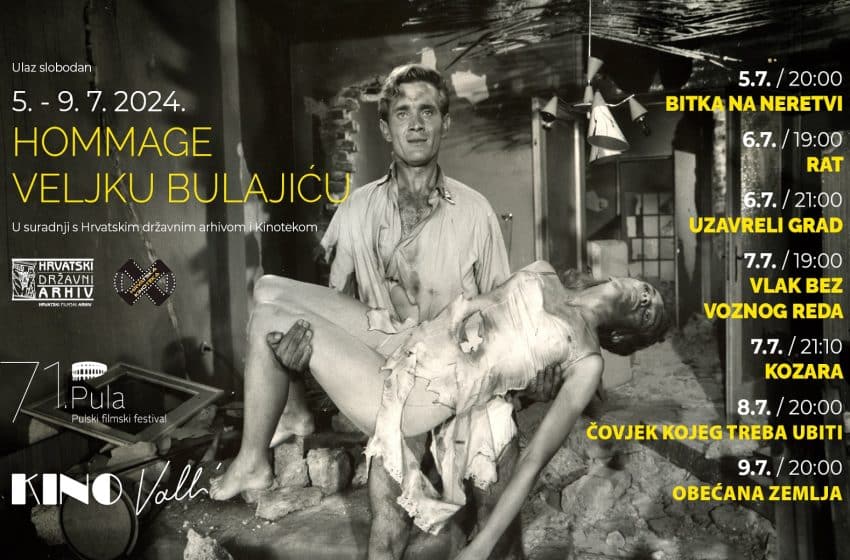Hommage to Veljko Bulajić at Valli Cinema


In cooperation with the the Croatian State Archives and Croatian Cinematheque, a film programme dedicated to the one of our greatest filmmakers, director Veljko Bulajić, who died in April this year, will be held at Valli Cinema before the official start of the 71st Pula Film Festival, from 5 to 9 July. He directed 14 feature films, two documentary films Skopje ’63 (1964) and Titovi memoari (1980), and two TV series. His debut feature, Vlak bez voznog reda (1959), won the Golden Arena for Best Screenplay and was screened in competition at Cannes. The film showed the relocation of inhabitants from the Dalmatian Hinterland to Vojvodina after World War II, and is heavily characterised by neorealism. In 1986 he made the film Obećana zemlja, which examines the politics of collectivisation. The political counterpart to these films is Uzavreli grad (Grand Golden Arena), an analysis of the phenomenon of industrialisation, both its faults and its virtues. However, he gained true domestic and global fame with his war films with partisan themes: Kozara (1962) – Grand Golden Arena and Gold Medal at the festival in Moscow, and especially Bitka na Neretvi (1969) – nominated for the Academy Award for Best Foreign Language Film and the most expensive Yugoslav film ever made. The film Čovjek kojeg traba ubiti (1979) – Bronze Arena for Best Director, is a surreal legend about the self-proclaimed Montenegrin emperor Šćepan Mali (Šćepan the Little) in the 18th century and political commentary of the global block division, advocating for the third, ‘non-aligned’ way. He received the national Vladimir Nazor Award for life achievement and the Zlatni Oktavijan Award for life achievement by the Croatian Society of Film Critics. The monograph Veljko Bulajić: Vlakom bez voznog reda u povijest filma was published in 2015.
I want to sign up for the Pula Film Festival newsletter and receive news. By applying, I accept the Privacy Protection Policy of JU PFF and give my consent to the collection, storage and processing of the data described there. You can unsubscribe at any time via the link in the e-mail.
Uspon na Kaštel 2, 52100 Pula
+385 52 393 321
info@pulafilmfestival.hr
MB:1705610, OIB:12904220272
IBAN HR6123600001102685281
WHO IS WHO
Sva prava pridržana © 2023 Pula Film Festival | Izrada Web stranica Webprojekt
